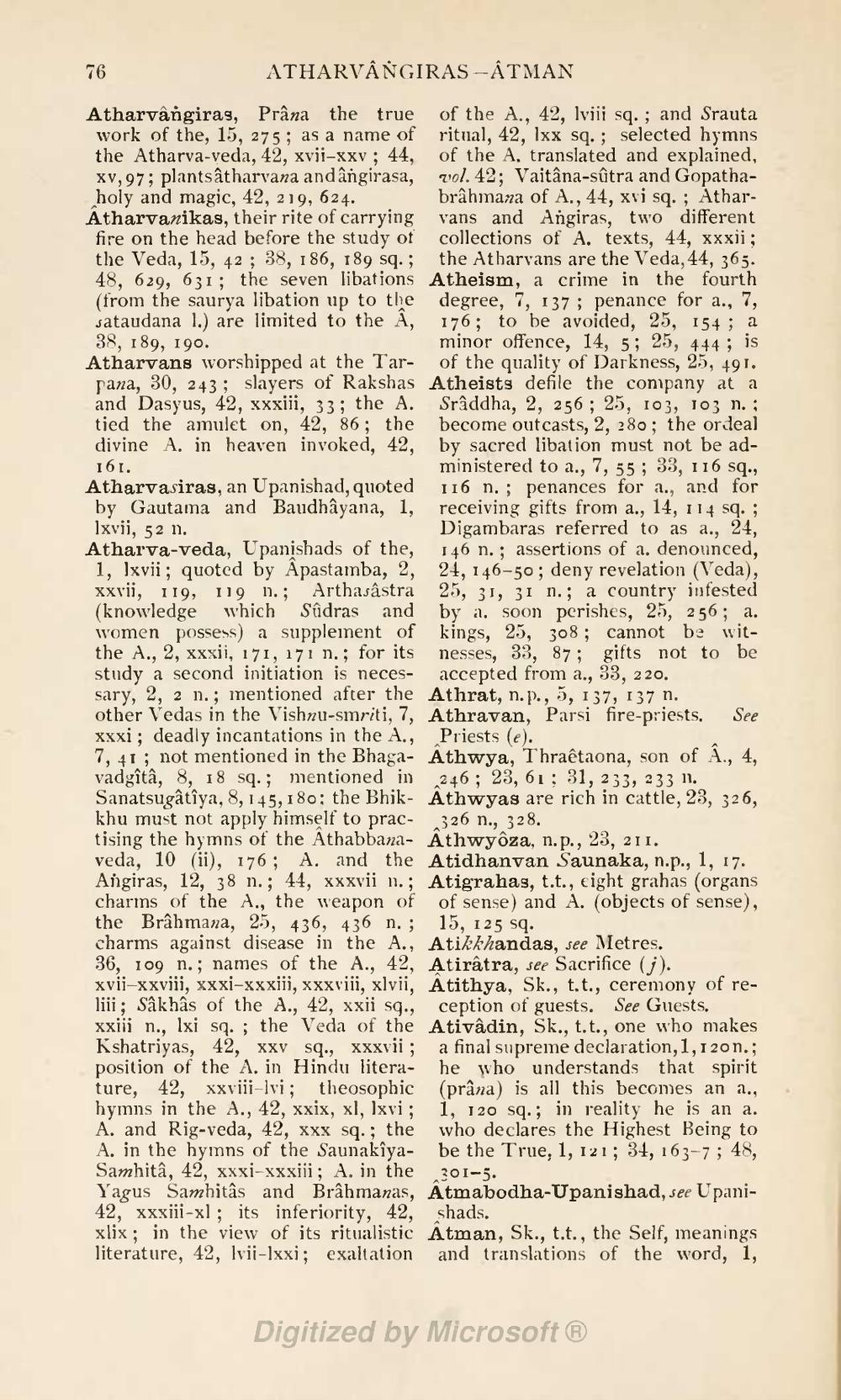________________
76
ATHARVÂNGIRAS-ATMAN
Atharvângiras, Prâna the true work of the, 15, 275; as a name of the Atharva-veda, 42, xvii-xxv; 44, xv, 97; plantsâtharvana and ângirasa, holy and magic, 42, 219, 624. Atharvanikas, their rite of carrying fire on the head before the study of the Veda, 15, 42; 38, 186, 189 sq.; 48, 629, 631; the seven libations (from the saurya libation up to the sataudana 1.) are limited to the A,
38, 189, 190. Atharvans worshipped at the Tarpana, 30, 243; slayers of Rakshas and Dasyus, 42, xxxiii, 33; the A. tied the amulet on, 42, 86; the divine A. in heaven invoked, 42, 161.
Atharvasiras, an Upanishad, quoted by Gautama and Baudhâyana, 1, lxvii, 52 n. Atharva-veda, Upanishads of the, 1, lxvii; quoted by Apastamba, 2, xxvii, 119, 119 n.; Arthasâstra (knowledge which Sûdras and women possess) a supplement of the A., 2, xxxii, 171, 171 n.; for its study a second initiation is necessary, 2, 2 n.; mentioned after the other Vedas in the Vishnu-smriti, 7, xxxi; deadly incantations in the A., 7, 41; not mentioned in the Bhagavadgîtâ, 8, 18 sq.; mentioned in Sanatsugâtîya, 8, 145, 180: the Bhikkhu must not apply himself to practising the hymns of the Athabbanaveda, 10 (ii), 176; A. and the Angiras, 12, 38 n.; 44, xxxvii n.; charms of the A., the weapon of the Brahmana, 25, 436, 436 n.; charms against disease in the A., 36, 109 n.; names of the A., 42, xvii-xxviii, xxxi-xxxiii, xxxviii, xlvii, liii; Sâkhâs of the A., 42, xxii sq., xxiii n., lxi sq.; the Veda of the Kshatriyas, 42, xxv sq., xxxvii ; position of the A. in Hindu literature, 42, xxviii-lvi; theosophic hymns in the A., 42, xxix, xl, lxvi; A. and Rig-veda, 42, xxx sq.; the A. in the hymns of the SaunakîyaSamhitâ, 42, xxxi-xxxiii; A. in the Yagus Samhitâs and Brahmanas, 42, xxxiii-xl; its inferiority, 42, xlix; in the view of its ritualistic literature, 42, lvii-lxxi; exaltation
of the A., 42, lviii sq.; and Srauta ritual, 42, lxx sq.; selected hymns of the A. translated and explained, vol. 42; Vaitâna-sûtra and Gopathabrâhmana of A., 44, xvi sq.; Atharvans and Angiras, two different collections of A. texts, 44, xxxii; the Atharvans are the Veda, 44, 365. Atheism, a crime in the fourth degree, 7, 137; penance for a., 7, 176; to be avoided, 25, 154; a minor offence, 14, 5; 25, 444; is of the quality of Darkness, 25, 491. Atheists defile the company at a Srâddha, 2, 256; 25, 103, 103 n. become outcasts, 2, 280; the ordeal by sacred libation must not be administered to a., 7, 55; 33, 116 sq., 116 n.; penances for a., and for receiving gifts from a., 14, 114 sq.; Digambaras referred to as a., 24, 146 n.; assertions of a. denounced, 24, 146-50; deny revelation (Veda), 25, 31, 31 n.; a country infested by a. soon perishes, 25, 256; a. kings, 25, 308; cannot be witnesses, 33, 87; gifts not to be accepted from a., 33, 220. Athrat, n.p., 5, 137, 137 n. Athravan, Parsi fire-priests. Priests (e). Athwya, Thraêtaona, son of Â., 246; 23, 61; 31, 233, 233 11. Athwyas are rich in cattle, 23, 326, 326 n., 328. Athwyôza, n.p., 23, 211. Atidhanvan Saunaka, n.p., 1, 17. Atigrahas, t.t., eight grahas (organs of sense) and A. (objects of sense), 15, 125 sq. Atikkhandas, see Metres. Atirâtra, see Sacrifice (j). Atithya, Sk., t.t., ceremony of reception of guests. See Guests. Ativâdin, Sk., t.t., one who makes a final supreme declaration, 1, 120n.; he who understands that spirit (prâna) is all this becomes an a., 1, 120 sq.; in reality he is an a. who declares the Highest Being to be the True, 1, 121; 34, 163-7; 48,
See
4,
301-5.
Atmabodha-Upanishad, see Upani
shads. Atman, Sk., t.t., the Self, meanings and translations of the word, 1,
Digitized by Microsoft R




